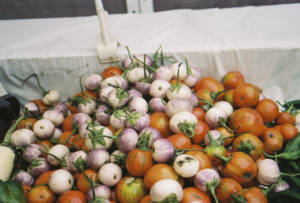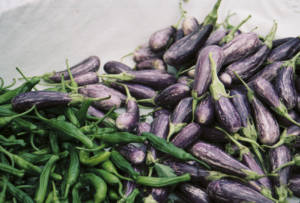
City Farm Chicago Aspires To Heal Marginalized Communities with Food
With a farm in the north side of Chicago, guerrilla farming in the south, and three resource centers spread throughout the city, City Farm is determined to make produce and recycling a lifestyle that is attainable to all citizens in the Greater Chicago area. Heirloom tomatoes, beets, herbs, arugula, salad greens, carrots, turnips, and radishes sprout through organic soil in areas that were once, for many years, home to project housing.
“In the ‘70s it was a Wild West show,” City Farm manager Samantha Levine, an Environmental Studies graduate from DePaul University, told us. After taking classes in city justice, she learned that there were entire communities in her own backyard that didn’t have access to fresh produce whatsoever. In that era, certain neighborhoods in Chicago became food deserts. “When I learned that I thought, ‘How can I continue with my life knowing this is happening?’ Everyone should have access to fresh food,” Levine reflected. And so she spent time developing her green thumb on farms along the West Coast and in India— mitigating the effects of Westernization in a country that isn’t ready for it— before she started growing her own produce at home. Soon, she found herself applying for a position within City Farm— which had been been a part of her life, in some capacity, for the prior decade-and-a-half.
“On the north side, the community that has been there for the last 14 to 15 years love us. They stop and ask if they can help; it’s very positive. The south side location can get a little intense and that’s because a lot of those neighborhoods have been marginalized, so the community tends to be wary of people coming in and developing their land. It has taken us awhile to penetrate that, and it’s common for farms to fail because they don’t have the support of the community, but at this point we are on good terms,” Levine says. City Farm, which aims to turn vacant urban spaces into productive farmland, has been successful in part because they humbly recognize the strengths of the community, rather than emphasizing what they’re lacking.
“Even a farm that’s not an intentional park has many psychological and physiological benefits. We tend to overlook that. The color of your skin doesn’t mean that you should be less entitled to produce. That way of life should be over.”
The marginalization within the South Side of Chicago began in the 1970’s, when a white flight commenced. Chicago housing projects opened up and redlining on the South Side was enacted. “A group of businessmen came together after noticing that a significant amount of African Americans were moving in. They agreed not to do business with them, and so the area stopped having [amenities and other social services], essentially.”
This meant that people couldn’t open bank accounts, buy houses, and from a commerce perspective this resulted in a food desert. “There are families that have never been to a grocery store here. They live off white bread, milk, Cheetos, ice-cream, and soda,” Levine continued with lament. This is an ongoing issue that Rahm Emanuel, Chicago’s mayor, agreed to remediate in the beginning of his term. He sat down with major chains like Whole Foods, Target, Kroger, and Mariano’s. Whole Foods’ 365, a new “affordable” version of the grocery chain that is set to open in the Evergreen Park suburbs next year, aims to be the first to change Chicago’s politics with food. “This is unprecedented, but the problem is that you have families that don’t know what they’re buying,” Levine suggests. “You’ve lost this element of food culture by living with a deprived market for so long,” she added.
City Farm’s goal has been to change the way we look at vacant spaces.
“Frequently when we leave spaces vacant it is because we are waiting for something useful to come in. The problem is that we denote ‘useful’ as a building that’s commercially based. We need to think of it in terms of quality of life. Even a farm that’s not an intentional park has many psychological and physiological benefits. We tend to overlook that. It goes back to redlining and how we treat our fellow Chicagoans. The color of your skin doesn’t mean that you should be less entitled to produce. That way of life should be over here, and we’re trying to make it so.”
To learn more about City Farm and its community initiatives (including opportunities to participate in their CSA!), visit the organization’s website. Produce is available for purchase at local markets and through their farmstead; LINK cards are also accepted.



































